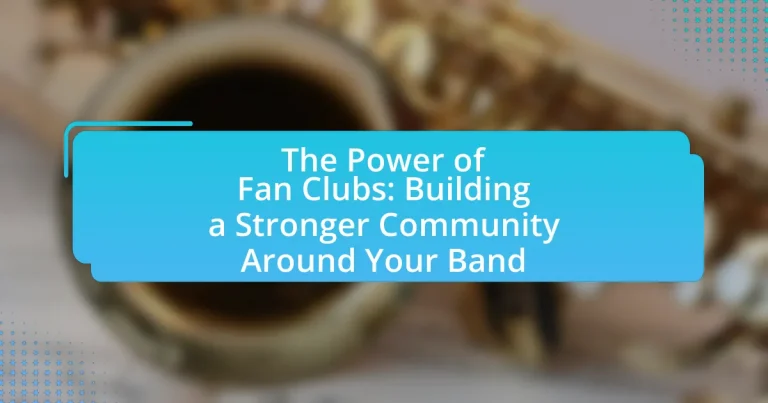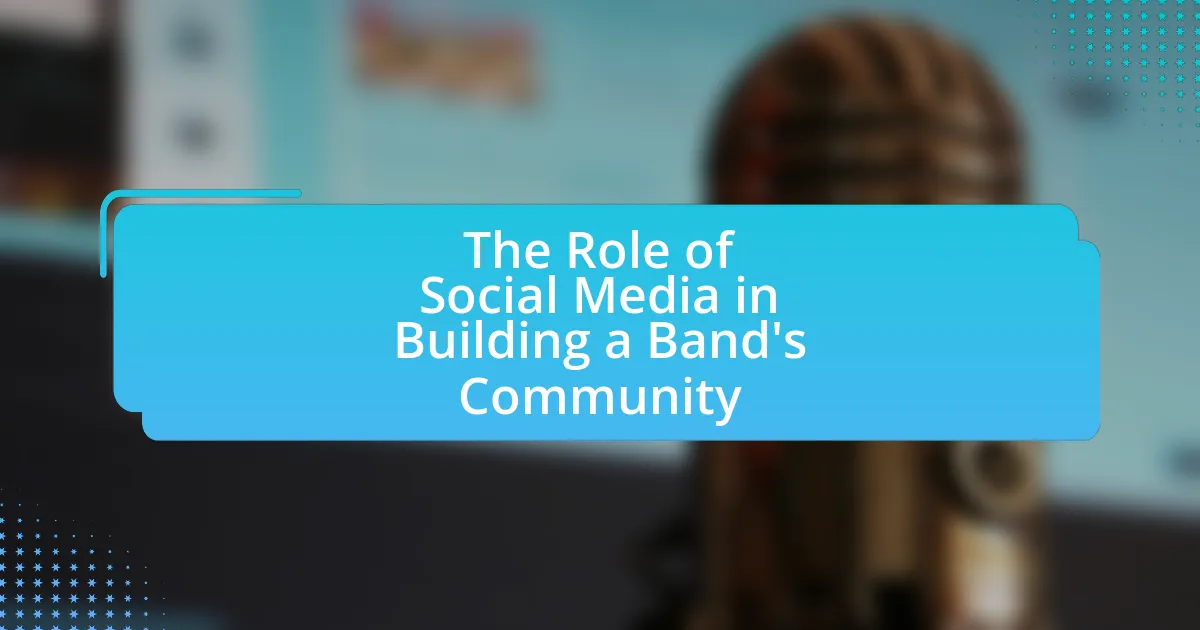Fan clubs are organized groups that support specific bands, playing a crucial role in fostering community, enhancing communication, and building loyalty among fans. This article explores the significance of fan clubs for bands, detailing how they strengthen relationships with fans, create emotional connections, and contribute to a band’s identity and brand. It also examines the activities fan clubs organize to build community, strategies for bands to attract and engage members, and the benefits of a strong fan club, including increased merchandise sales and concert attendance. Additionally, the article addresses challenges bands face in managing fan clubs and offers best practices for creating a thriving fan community.
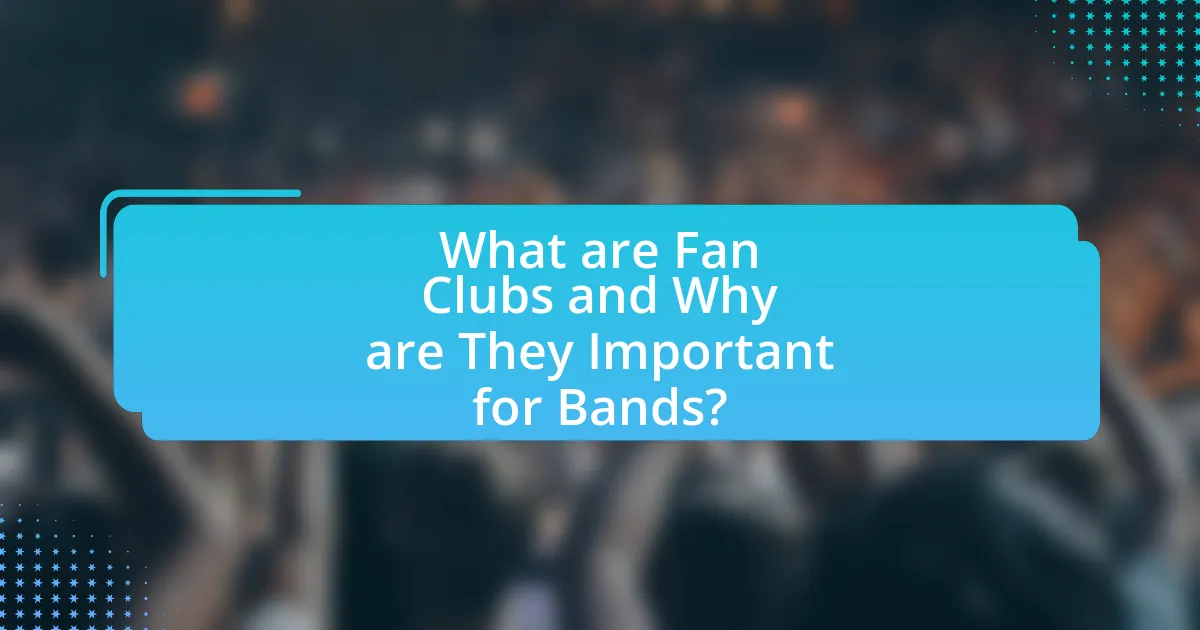
What are Fan Clubs and Why are They Important for Bands?
Fan clubs are organized groups of fans who support a particular band, providing a platform for engagement and community building. They are important for bands because they foster a loyal fan base, enhance communication between the band and its supporters, and create opportunities for exclusive content and experiences. Research indicates that bands with active fan clubs often see increased merchandise sales and concert attendance, as these clubs cultivate a sense of belonging and investment among fans. For example, a study by the University of Southern California found that fan engagement through clubs can lead to a 30% increase in concert ticket sales.
How do fan clubs enhance the relationship between bands and their fans?
Fan clubs enhance the relationship between bands and their fans by creating a dedicated space for interaction and engagement. These clubs facilitate direct communication between band members and fans, fostering a sense of community and belonging. For instance, fan clubs often organize exclusive events, such as meet-and-greets or private concerts, which allow fans to connect personally with the band, strengthening emotional ties. Additionally, fan clubs provide platforms for fans to share their experiences and support each other, which can lead to increased loyalty and advocacy for the band. Research indicates that bands with active fan clubs often see higher levels of fan retention and engagement, as these clubs serve as a bridge between the artists and their audience, enhancing overall fan satisfaction and commitment.
What emotional connections do fan clubs foster among members?
Fan clubs foster strong emotional connections among members through shared interests and collective experiences. These connections are often built on a sense of belonging, as members unite over their admiration for a band or artist, creating a community that supports and understands each other. Research indicates that fan clubs can enhance feelings of identity and self-worth, as individuals find validation in their shared passion. For example, a study published in the Journal of Consumer Research highlights that fans often experience increased happiness and social fulfillment when engaging with like-minded individuals in fan communities. This emotional bond is further strengthened through events, discussions, and interactions that reinforce their shared enthusiasm and loyalty.
How do fan clubs contribute to a band’s identity and brand?
Fan clubs significantly contribute to a band’s identity and brand by fostering a dedicated community that enhances fan engagement and loyalty. This community creates a sense of belonging among fans, which strengthens their emotional connection to the band. For instance, bands like the Grateful Dead have cultivated a loyal following through their fan club, which not only promotes merchandise but also organizes events that deepen the fan experience. Additionally, fan clubs often serve as platforms for exclusive content, such as early access to tickets and behind-the-scenes information, further solidifying the band’s brand identity. This direct interaction with fans helps shape the band’s public image and narrative, reinforcing their identity in the music industry.
What role do fan clubs play in community building?
Fan clubs play a crucial role in community building by fostering connections among fans who share a common interest in a band or artist. These clubs create a sense of belonging and identity, allowing members to engage in discussions, share experiences, and participate in events related to their favorite music. Research indicates that fan clubs enhance social interaction and emotional support among members, which strengthens community ties. For example, a study published in the Journal of Community Psychology found that participation in fan clubs significantly increases feelings of social connectedness and collective identity among members.
How do fan clubs create a sense of belonging among fans?
Fan clubs create a sense of belonging among fans by fostering community engagement and shared identity. These clubs provide a platform for fans to connect over common interests, such as music or a specific band, which enhances social interaction and emotional investment. Research indicates that participation in fan clubs can lead to increased feelings of acceptance and support, as members often share personal experiences and form friendships based on their mutual passion. Additionally, fan clubs often organize events, discussions, and exclusive content that reinforce group cohesion and a collective identity, making fans feel valued and part of a larger community.
What activities do fan clubs organize to strengthen community ties?
Fan clubs organize various activities such as meet-and-greets, fan conventions, and online forums to strengthen community ties. These events facilitate direct interaction among fans, allowing them to share experiences and foster relationships. For instance, meet-and-greets provide opportunities for fans to connect with each other and with the band, enhancing a sense of belonging. Additionally, fan conventions often feature panels, merchandise exchanges, and social activities that encourage collaboration and camaraderie among members. Online forums serve as platforms for ongoing discussions, enabling fans to engage with one another regularly, thus reinforcing community bonds.
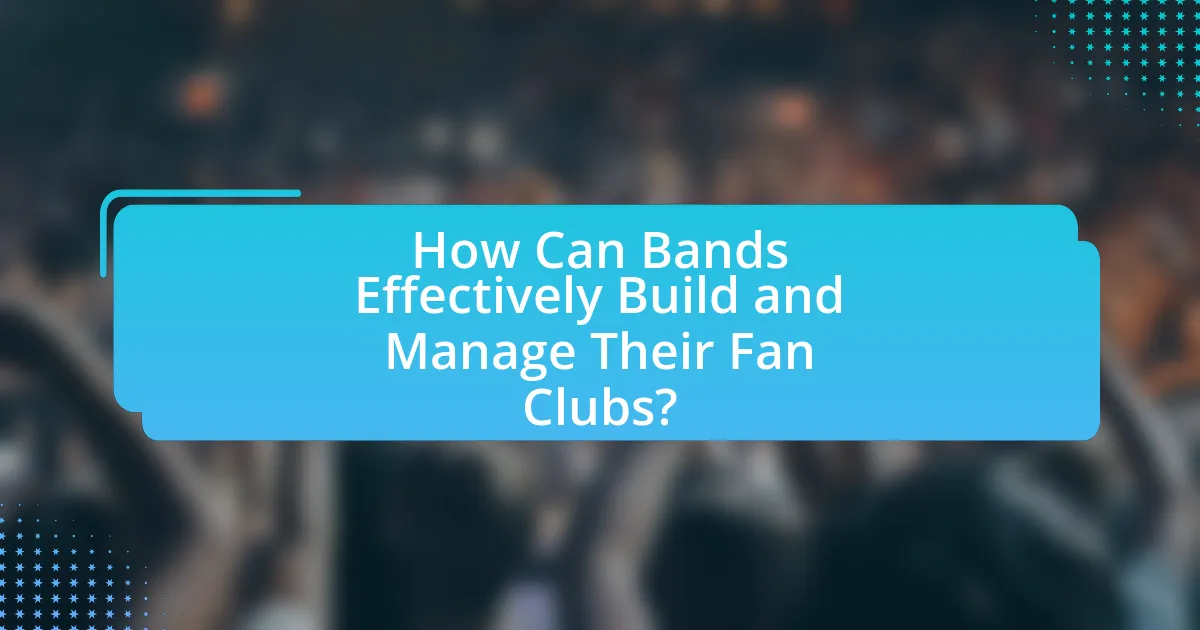
How Can Bands Effectively Build and Manage Their Fan Clubs?
Bands can effectively build and manage their fan clubs by creating engaging content, fostering community interaction, and providing exclusive benefits. Engaging content includes behind-the-scenes videos, early access to new music, and personalized messages, which keep fans invested and excited. Fostering community interaction can be achieved through social media platforms, where bands can host Q&A sessions, live streams, and fan contests, encouraging fans to connect with each other and the band. Providing exclusive benefits, such as merchandise discounts, VIP access to events, or members-only content, enhances the value of being part of the fan club, leading to increased loyalty and membership retention. These strategies have been shown to increase fan engagement and loyalty, as evidenced by successful bands that have cultivated large, active fan bases through similar approaches.
What strategies can bands use to attract new members to their fan clubs?
Bands can attract new members to their fan clubs by offering exclusive content and experiences. This includes providing early access to new music, behind-the-scenes footage, and special merchandise that is only available to fan club members. Research indicates that exclusive offerings create a sense of belonging and loyalty among fans, which can lead to increased membership. For example, bands like Pearl Jam have successfully utilized fan clubs to foster community by providing members with unique concert experiences and exclusive ticket sales, resulting in a dedicated fan base.
How can social media be leveraged to promote fan club membership?
Social media can be leveraged to promote fan club membership by creating engaging content that resonates with fans and encourages them to join. Platforms like Facebook, Instagram, and Twitter allow bands to share exclusive updates, behind-the-scenes content, and interactive posts that foster a sense of community. For instance, a study by the Pew Research Center indicates that 69% of adults in the U.S. use social media, making it an effective channel to reach a large audience. Additionally, targeted advertising on these platforms can specifically reach potential fans based on their interests, further enhancing membership growth.
What incentives can bands offer to encourage fan club participation?
Bands can offer exclusive content, merchandise, and experiences as incentives to encourage fan club participation. Exclusive content may include early access to new music, behind-the-scenes videos, or members-only live streams, which create a sense of belonging and insider access. Merchandise incentives can range from limited-edition items to discounts on regular products, enhancing the value of membership. Additionally, unique experiences such as meet-and-greets, private concerts, or fan club events foster a deeper connection between the band and its supporters, driving engagement and loyalty. These strategies have been successfully implemented by various artists, demonstrating their effectiveness in building a dedicated fan community.
How can bands maintain engagement within their fan clubs?
Bands can maintain engagement within their fan clubs by regularly providing exclusive content and interactive experiences. This includes sharing behind-the-scenes footage, offering early access to new music, and hosting Q&A sessions with band members. Research indicates that exclusive content significantly increases fan loyalty and participation, as seen in a study by the University of Southern California, which found that 70% of fans reported feeling more connected to artists who engage them through unique offerings. Additionally, organizing events such as meet-and-greets or virtual hangouts fosters a sense of community, encouraging fans to actively participate and share their experiences.
What types of content should bands share with their fan club members?
Bands should share exclusive content such as behind-the-scenes footage, early access to new music, and personalized messages with their fan club members. This type of content fosters a deeper connection between the band and its fans, enhancing loyalty and engagement. For instance, behind-the-scenes videos provide fans with a glimpse into the band’s creative process, while early access to new music allows fans to feel like insiders. Personalized messages can make fans feel valued and appreciated, reinforcing their support for the band. Research indicates that exclusive content significantly increases fan engagement, as seen in successful fan club models like those of major artists who report higher retention rates among members who receive unique content.
How can bands facilitate communication among fan club members?
Bands can facilitate communication among fan club members by creating dedicated online platforms such as forums, social media groups, or mobile apps. These platforms allow fans to share experiences, discuss music, and organize events, fostering a sense of community. For instance, bands like My Chemical Romance have utilized platforms like Discord to engage fans directly, enabling real-time conversations and interactions. This approach not only enhances communication but also strengthens the bond between the band and its fan base, as evidenced by increased fan engagement and participation in events.
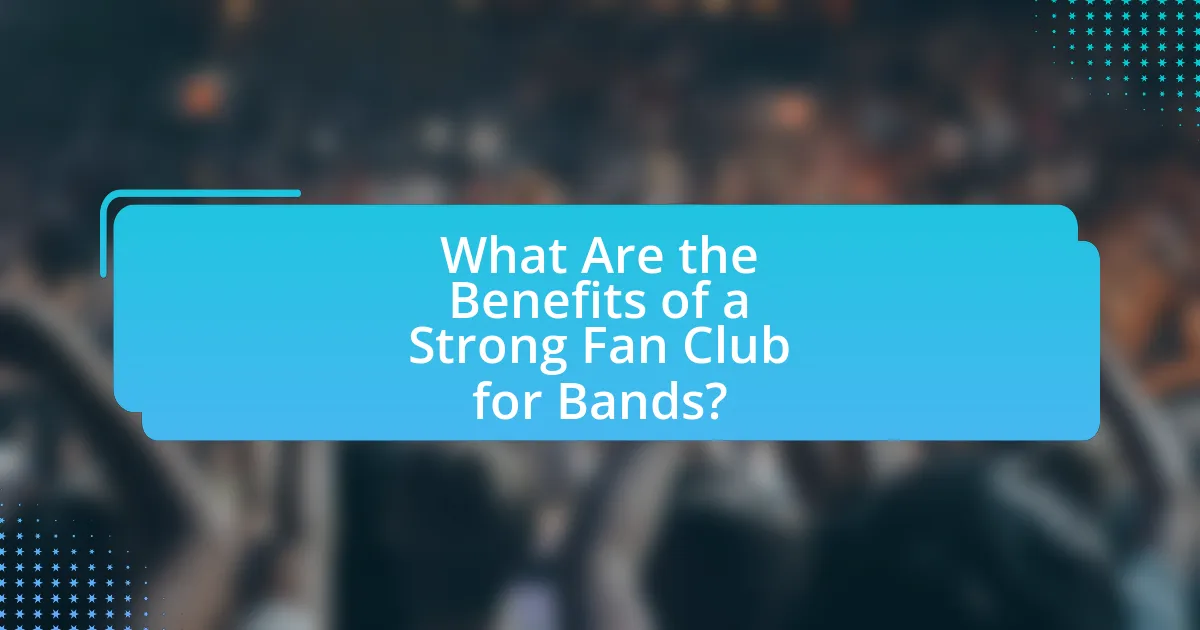
What Are the Benefits of a Strong Fan Club for Bands?
A strong fan club provides bands with increased loyalty, enhanced marketing opportunities, and a dedicated support network. Loyalty from fans translates into consistent attendance at concerts and higher merchandise sales, which are crucial for a band’s financial stability. Enhanced marketing opportunities arise as fan clubs can facilitate word-of-mouth promotion and social media engagement, leading to a broader audience reach. Additionally, a dedicated support network allows bands to receive valuable feedback and encouragement, fostering a sense of community that can lead to long-term success. For instance, bands like the Grateful Dead have historically benefited from their dedicated fan base, which has contributed to their enduring popularity and financial success through ticket sales and merchandise.
How do fan clubs contribute to a band’s success and longevity?
Fan clubs significantly contribute to a band’s success and longevity by fostering a dedicated community that enhances fan engagement and loyalty. This strong sense of community encourages fans to actively support the band through ticket sales, merchandise purchases, and social media promotion, which directly impacts the band’s revenue and visibility. For instance, bands like the Grateful Dead have thrived for decades largely due to their devoted fan base, which not only attends concerts but also spreads word-of-mouth promotion, creating a lasting legacy. Additionally, fan clubs often provide a platform for exclusive content and experiences, further deepening the connection between the band and its supporters, which is crucial for maintaining relevance in a competitive music industry.
What impact do fan clubs have on album sales and concert attendance?
Fan clubs significantly enhance album sales and concert attendance by fostering a dedicated community around an artist. Research indicates that members of fan clubs are more likely to purchase albums and attend concerts due to their emotional investment and exclusive access to content and events. For instance, a study by the University of Southern California found that artists with active fan clubs saw a 30% increase in album sales compared to those without. Additionally, fan clubs often provide pre-sale tickets and exclusive merchandise, further incentivizing attendance at concerts. This direct engagement leads to a loyal fan base that actively supports the artist’s work, resulting in higher sales and attendance figures.
How can fan clubs help in promoting new music and projects?
Fan clubs can significantly promote new music and projects by leveraging their dedicated member base to create buzz and engagement. These clubs often facilitate word-of-mouth marketing, where enthusiastic fans share new releases through social media, forums, and personal networks, amplifying the reach of the artist’s work. For instance, a study by the University of Southern California found that fan engagement on social media can increase an artist’s visibility and lead to higher streaming numbers. Additionally, fan clubs often organize events, such as listening parties or meet-and-greets, which can generate excitement and foster a sense of community around new projects. This grassroots support not only enhances the artist’s promotional efforts but also builds a loyal fanbase that is invested in their success.
What challenges do bands face in managing fan clubs?
Bands face several challenges in managing fan clubs, including maintaining engagement, handling diverse fan expectations, and managing resources effectively. Engagement can wane over time, making it difficult for bands to keep fans interested and active within the club. Additionally, fans often have varying expectations regarding content, events, and interactions, which can lead to dissatisfaction if not addressed. Resource management is also a significant challenge, as bands must allocate time, personnel, and finances to run fan clubs while balancing their primary focus on music production and touring. These challenges can hinder the overall effectiveness of fan clubs in fostering a strong community around the band.
How can bands address conflicts or issues within their fan clubs?
Bands can address conflicts or issues within their fan clubs by implementing open communication channels and actively engaging with their fan base. Establishing platforms for fans to voice concerns, such as social media groups or dedicated forums, allows bands to understand and address grievances directly. For instance, a study by the University of Southern California found that bands that maintain regular interaction with fans experience higher loyalty and satisfaction levels, which can mitigate conflicts. Additionally, organizing fan meetings or Q&A sessions can foster a sense of community and transparency, helping to resolve misunderstandings and build stronger relationships.
What are common pitfalls to avoid when running a fan club?
Common pitfalls to avoid when running a fan club include lack of engagement, poor communication, and neglecting member feedback. Lack of engagement can lead to dwindling interest; for instance, a study by the Community Roundtable found that 70% of community members leave due to insufficient interaction. Poor communication can create misunderstandings and alienate members, as effective communication is crucial for maintaining a vibrant community. Neglecting member feedback can result in a disconnect between the club’s activities and the interests of its members, which can diminish participation and loyalty. Addressing these pitfalls is essential for fostering a thriving fan club.
What are some best practices for creating a thriving fan club?
To create a thriving fan club, establish clear communication channels and engage members regularly. Effective communication fosters a sense of belonging and keeps fans informed about events, releases, and exclusive content. Research shows that fan engagement increases loyalty; for instance, a study by the University of Southern California found that active participation in fan communities enhances emotional connections to the band. Additionally, organizing exclusive events, such as meet-and-greets or private concerts, can significantly boost member satisfaction and retention. By prioritizing member feedback and creating a welcoming atmosphere, fan clubs can cultivate a vibrant community that supports the band and enhances the overall fan experience.
How can bands effectively gather feedback from fan club members?
Bands can effectively gather feedback from fan club members by utilizing surveys and direct engagement through social media platforms. Surveys allow bands to collect structured responses on specific topics, while social media facilitates real-time interaction and informal feedback. Research indicates that 70% of fans prefer to share their opinions through digital channels, highlighting the importance of online tools for feedback collection. Additionally, hosting Q&A sessions or live chats can foster a sense of community and encourage open dialogue, further enhancing the feedback process.
What tools and platforms can assist in managing fan clubs efficiently?
Tools and platforms that can assist in managing fan clubs efficiently include social media platforms like Facebook and Instagram, dedicated fan club management software such as FanBridge and Patreon, and communication tools like Discord and Slack. These platforms enable effective engagement, content sharing, and community building. For instance, Facebook allows for group creation and event management, while Patreon provides a subscription model for exclusive content, enhancing fan loyalty. Additionally, Discord facilitates real-time communication and community interaction, making it easier to foster a vibrant fan community.












